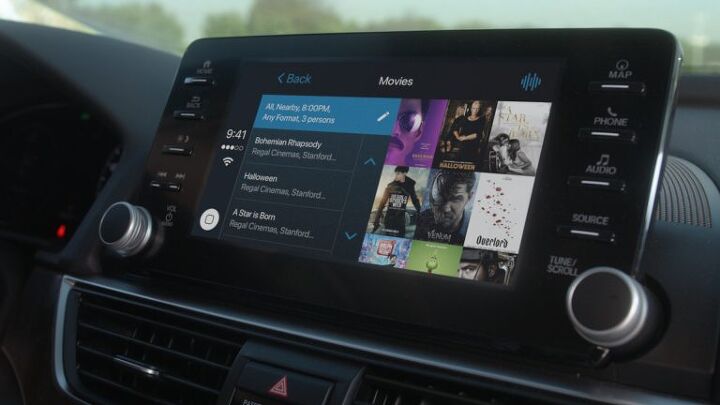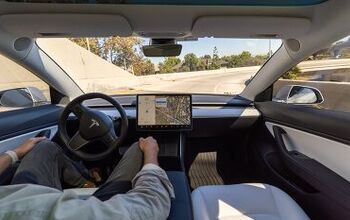Honda Dream Drive: In-car Shopping, Marketing, Gamification

Expanding on last year’s concept, Honda is reintroducing “Dream Drive” for this year’s Consumer Electronics Show (CES). Previously a platform intended to provide passengers with augmented and virtual reality experiences, Double D now focuses primarily on in-car purchases. In fact, the service seems identical to General Motors’ Marketplace.
That’s right, Honda is entering the dark realm of in-car consumerism and twisted corporate partnerships.
The automaker is already working with Mastercard, Visa, and PayPal to build Dream Drive into a reality. As a byproduct, stored credit card information should make shopping while driving a little safer. Unfortunately, this kind of service comes with a host of issues that leaves us feel more than a little nervous.
Honda is keen to assuage our fears.
The biggest issue is safety. Paying for fuel and parking from the comfort of the driver’s seat is fine, but Honda also wants people to be able to make last-minute reservations at their favorite restaurant or shop for movie tickets while on the go. While this may be convenient, we’re not convinced it’s any safer than someone trying to manage the same activity via their phone.
The manufacturer handles with this by minimizing visual distractions and trying to implement voice commands wherever possible. Many features can be accessed by saying “OK, Honda,” plus the applicable request. It’s not clear how robust this aspect of Dream Drive will be.
Honda is partnering with companies like Chevron, Phillips 66, AAA, Parkopedia, Arrive, Atom Tickets, Grubhub and Yelp to handle the new business, but it’s also dealing with Univision Music, iHeartRadio, Silvergate Media, DC and Lego Group to build a media library to occupy restless passengers. Everything from music to comics to games are said to be available once the services officially launches.
While Dream Drive is still technically just a prototype, it’s one the automaker and its partners are throwing a lot of weight behind. The system is already compatible with Apple CarPlay and Android Auto.
We imagine Honda, and just about every other industry player, will have their own in-car shopping service long before autonomous driving technology make such a service truly safe to use. But safety isn’t the only issue that needs to be addressed.
In-car marketing is poised to become a real problem, and soon. As safe as Honda and General Motors want to make these systems, their business partners will no doubt want to duke it out for preferential treatment in the menus to ensure you buy from them. This could swiftly evolve into some very distracting center displays if the automakers can’t exercise restraint.
Honda also said it wants to bake in some kind of rewards program. How exactly this would work is unclear at this stage. Presumably, repeated transactions will garner some kind of financial benefit toward subsequent in-car purchases. However, there is also some gamification going on with the Dream Drive app that simply awards passengers and drivers with “points” just for using it. Those points can be collected and used for … something.
“The gamification of everyday travel experiences with rewards points provides Honda with a unique opportunity to connect with its drivers and passengers, to establish a more personal engaging relationship with them, and to enhance customers’ daily lives with the automotive industry’s first frequent driving and riding program,” explained Bryan Biniak, CEO of Connected Travel. “Honda drivers and passengers earn points from common activities as well as extraordinary experiences created with market leading brands and developers, and then redeem their reward points at their favorite local and online retailers.”
Honestly, we don’t think Honda knows at this point. But it’s likely learned from mobile games using predatory micro-transactions that parsing out rewards over time is a good way to keep customers invested. Better to have the system in place and not use it than ignore a potential money-making scheme during the development phase.
There are also inherent security concerns associated with vehicles that are perpetually connected to the internet, endlessly transmitting data into the ether. But Honda says it’s tackling this problem with all the seriousness in the world. Of course, we wouldn’t expect an automaker to say otherwise.
[Images: Honda]

A staunch consumer advocate tracking industry trends and regulation. Before joining TTAC, Matt spent a decade working for marketing and research firms based in NYC. Clients included several of the world’s largest automakers, global tire brands, and aftermarket part suppliers. Dissatisfied with the corporate world and resentful of having to wear suits everyday, he pivoted to writing about cars. Since then, that man has become an ardent supporter of the right-to-repair movement, been interviewed on the auto industry by national radio broadcasts, driven more rental cars than anyone ever should, participated in amateur rallying events, and received the requisite minimum training as sanctioned by the SCCA. Handy with a wrench, Matt grew up surrounded by Detroit auto workers and managed to get a pizza delivery job before he was legally eligible. He later found himself driving box trucks through Manhattan, guaranteeing future sympathy for actual truckers. He continues to conduct research pertaining to the automotive sector as an independent contractor and has since moved back to his native Michigan, closer to where the cars are born. A contrarian, Matt claims to prefer understeer — stating that front and all-wheel drive vehicles cater best to his driving style.
More by Matt Posky
Latest Car Reviews
Read moreLatest Product Reviews
Read moreRecent Comments
- Jalop1991 In a manner similar to PHEV being the correct answer, I declare RPVs to be the correct answer here.We're doing it with certain aircraft; why not with cars on the ground, using hardware and tools like Telsa's "FSD" or GM's "SuperCruise" as the base?Take the local Uber driver out of the car, and put him in a professional centralized environment from where he drives me around. The system and the individual car can have awareness as well as gates, but he's responsible for the driving.Put the tech into my car, and let me buy it as needed. I need someone else to drive me home; hit the button and voila, I've hired a driver for the moment. I don't want to drive 11 hours to my vacation spot; hire the remote pilot for that. When I get there, I have my car and he's still at his normal location, piloting cars for other people.The system would allow for driver rest period, like what's required for truckers, so I might end up with multiple people driving me to the coast. I don't care. And they don't have to be physically with me, therefore they can be way cheaper.Charge taxi-type per-mile rates. For long drives, offer per-trip rates. Offer subscriptions, including miles/hours. Whatever.(And for grins, dress the remote pilots all as Johnnie.)Start this out with big rigs. Take the trucker away from the long haul driving, and let him be there for emergencies and the short haul parts of the trip.And in a manner similar to PHEVs being discredited, I fully expect to be razzed for this brilliant idea (not unlike how Alan Kay wasn't recognized until many many years later for his Dynabook vision).
- B-BodyBuick84 Not afraid of AV's as I highly doubt they will ever be %100 viable for our roads. Stop-and-go downtown city or rush hour highway traffic? I can see that, but otherwise there's simply too many variables. Bad weather conditions, faded road lines or markings, reflective surfaces with glare, etc. There's also the issue of cultural norms. About a decade ago there was actually an online test called 'The Morality Machine' one could do online where you were in control of an AV and choose what action to take when a crash was inevitable. I think something like 2.5 million people across the world participated? For example, do you hit and most likely kill the elderly couple strolling across the crosswalk or crash the vehicle into a cement barrier and almost certainly cause the death of the vehicle occupants? What if it's a parent and child? In N. America 98% of people choose to hit the elderly couple and save themselves while in Asia, the exact opposite happened where 98% choose to hit the parent and child. Why? Cultural differences. Asia puts a lot of emphasis on respecting their elderly while N. America has a culture of 'save/ protect the children'. Are these AV's going to respect that culture? Is a VW Jetta or Buick Envision AV going to have different programming depending on whether it's sold in Canada or Taiwan? how's that going to effect legislation and legal battles when a crash inevitibly does happen? These are the true barriers to mass AV adoption, and in the 10 years since that test came out, there has been zero answers or progress on this matter. So no, I'm not afraid of AV's simply because with the exception of a few specific situations, most avenues are going to prove to be a dead-end for automakers.
- Mike Bradley Autonomous cars were developed in Silicon Valley. For new products there, the standard business plan is to put a barely-functioning product on the market right away and wait for the early-adopter customers to find the flaws. That's exactly what's happened. Detroit's plan is pretty much the opposite, but Detroit isn't developing this product. That's why dealers, for instance, haven't been trained in the cars.
- Dartman https://apnews.com/article/artificial-intelligence-fighter-jets-air-force-6a1100c96a73ca9b7f41cbd6a2753fdaAutonomous/Ai is here now. The question is implementation and acceptance.
- FreedMike If Dodge were smart - and I don't think they are - they'd spend their money refreshing and reworking the Durango (which I think is entering model year 3,221), versus going down the same "stuff 'em full of motor and give 'em cool new paint options" path. That's the approach they used with the Charger and Challenger, and both those models are dead. The Durango is still a strong product in a strong market; why not keep it fresher?





































Comments
Join the conversation
Great, now we can install apps in our cars that will track us wherever we go and sell that data to whoever wants to pay for it! How much do you want to bet that Facebook will be one of the apps pre-installed on your new Honda? We already have seen stories in the tech press today that the Facebook app that is pre-installed on Samsung phones cannot be uninstalled. When will people have had enough? More importantly, when are we going to actually get some consumer privacy protection laws in this country?
Just scanning the comments before I chime in... This’ll never work anyway! Honda has the absolute worst worst voice-recognition in the industry! (At least as far as my 2013, 9th-Gen Accord is concerned, which just like my 2006 before, will crank up the heat when I ask for “trip computer!”) And from what I’ve heard, the newer systems aren’t much of an improvement!